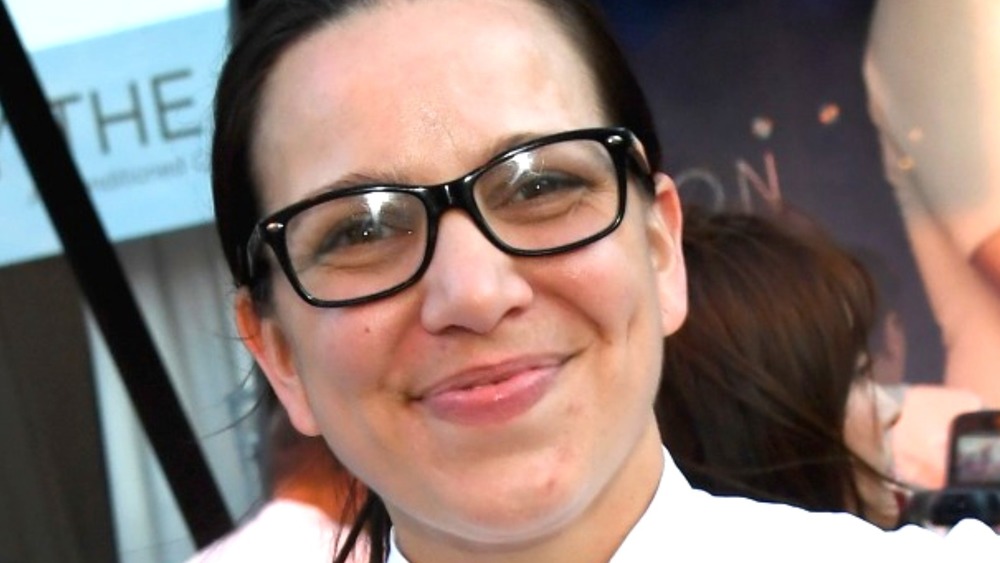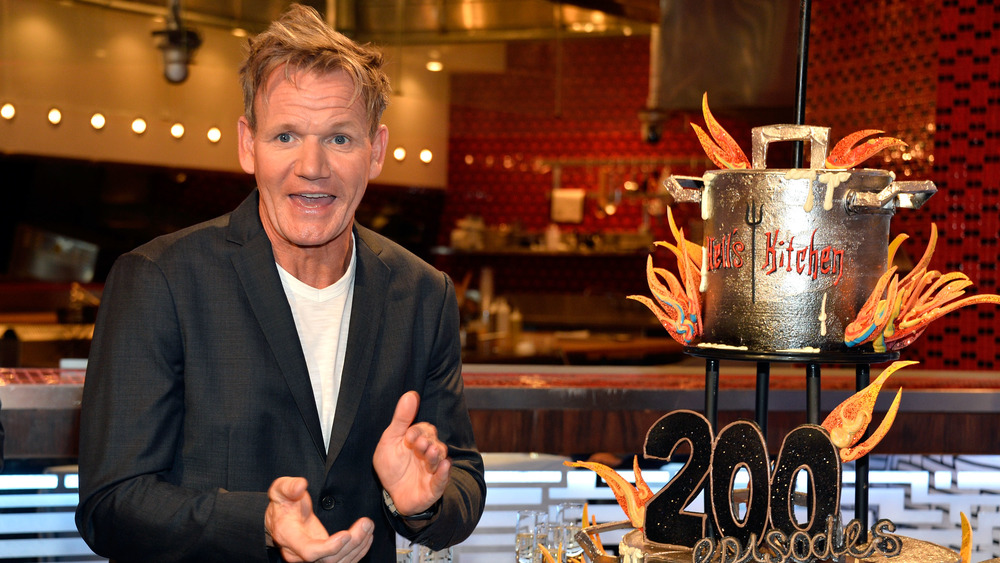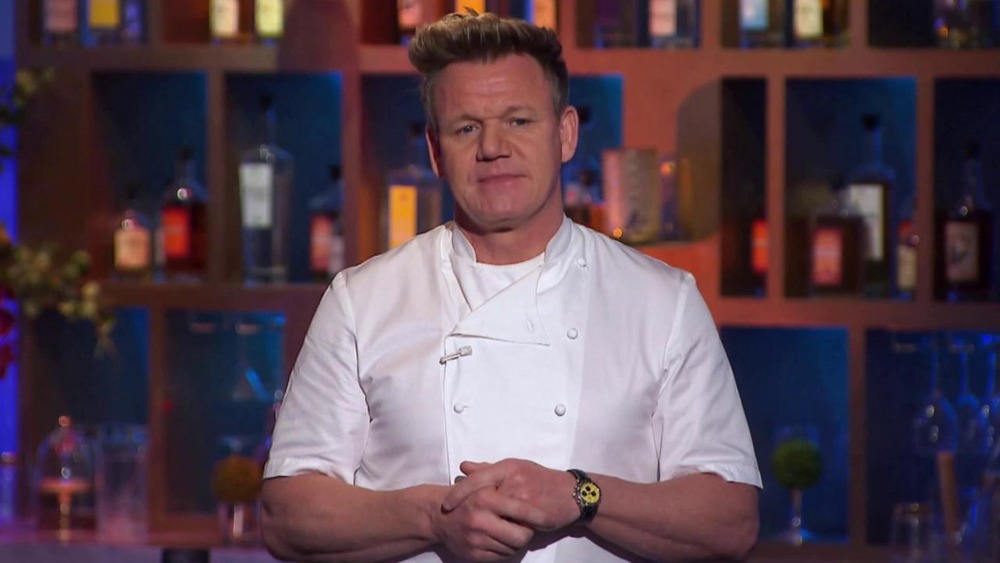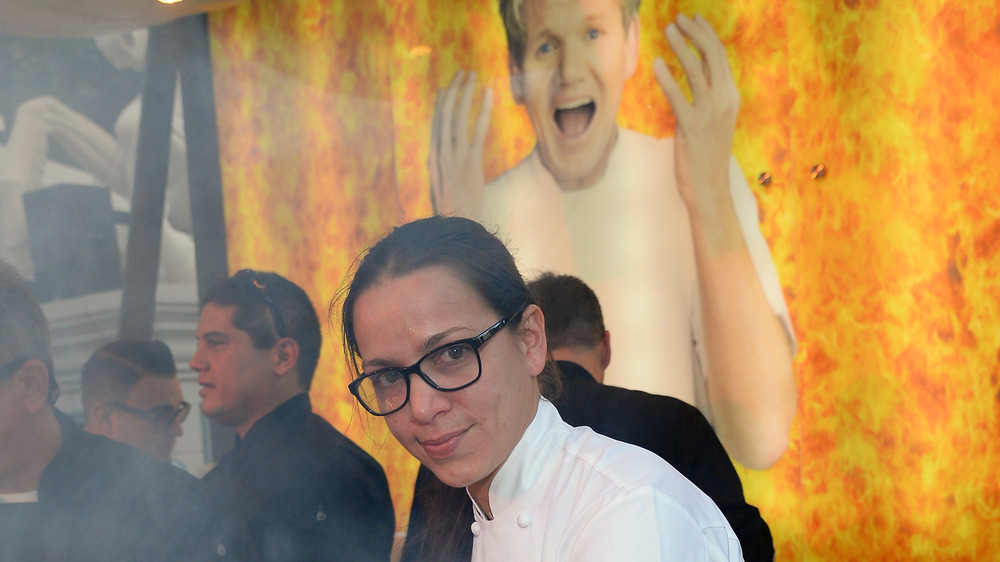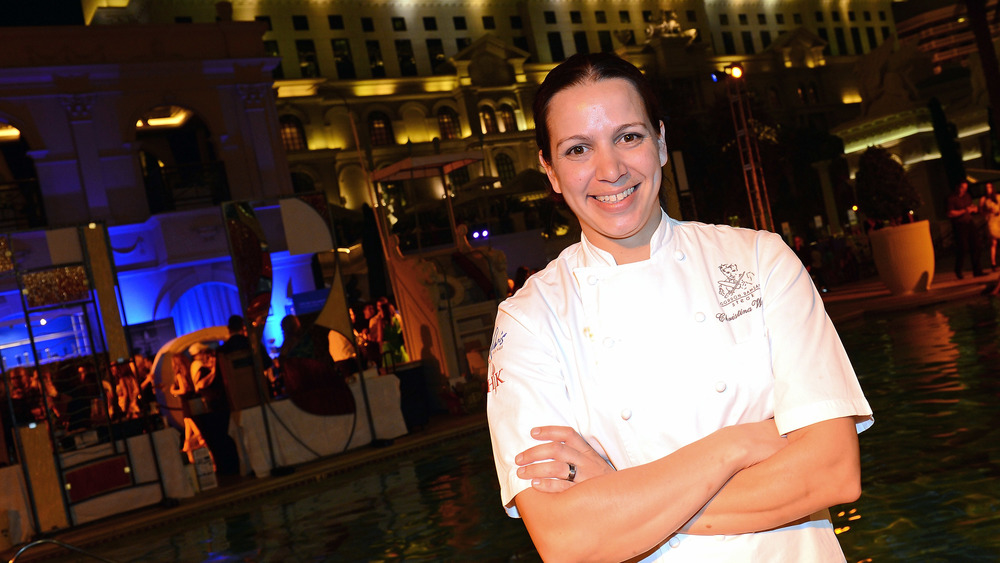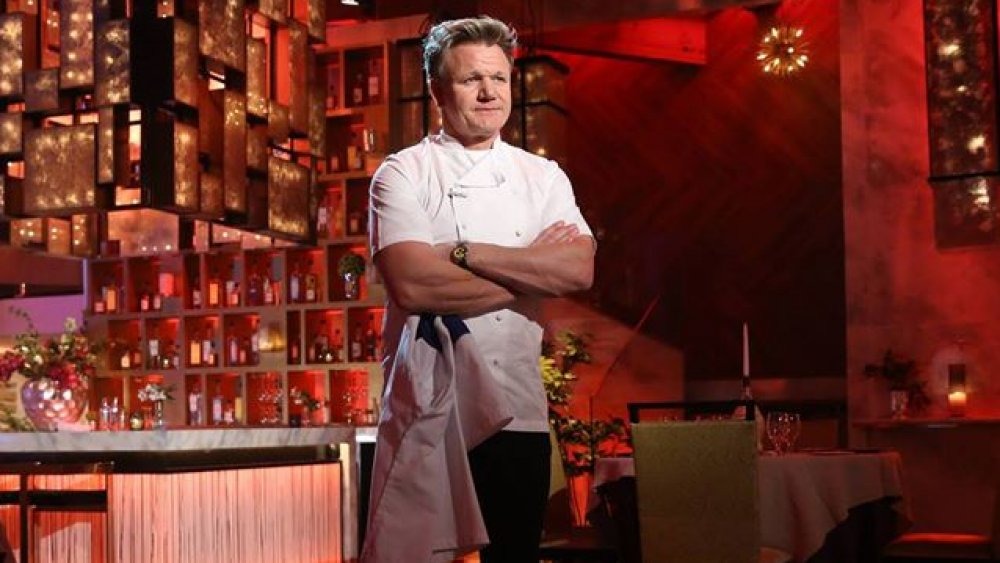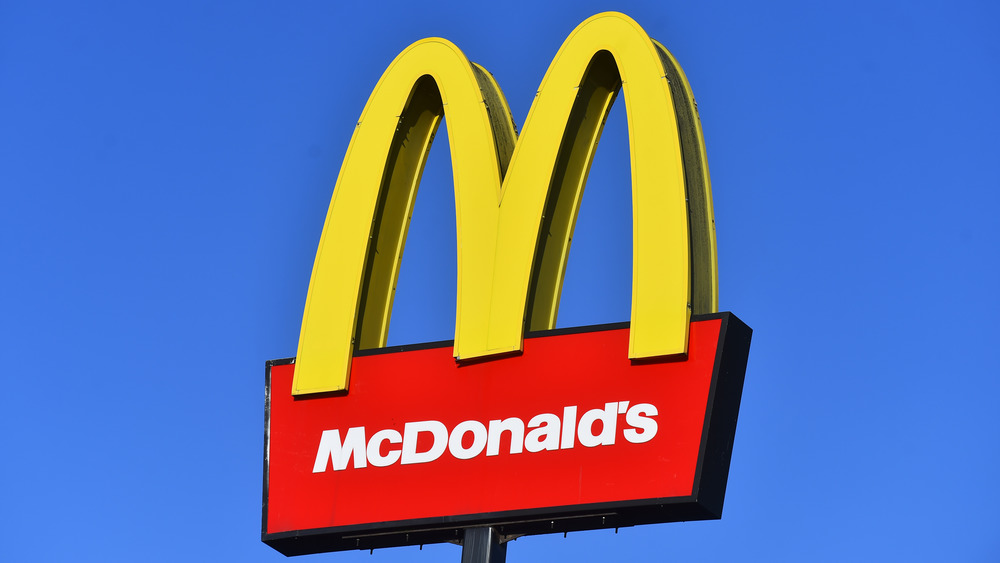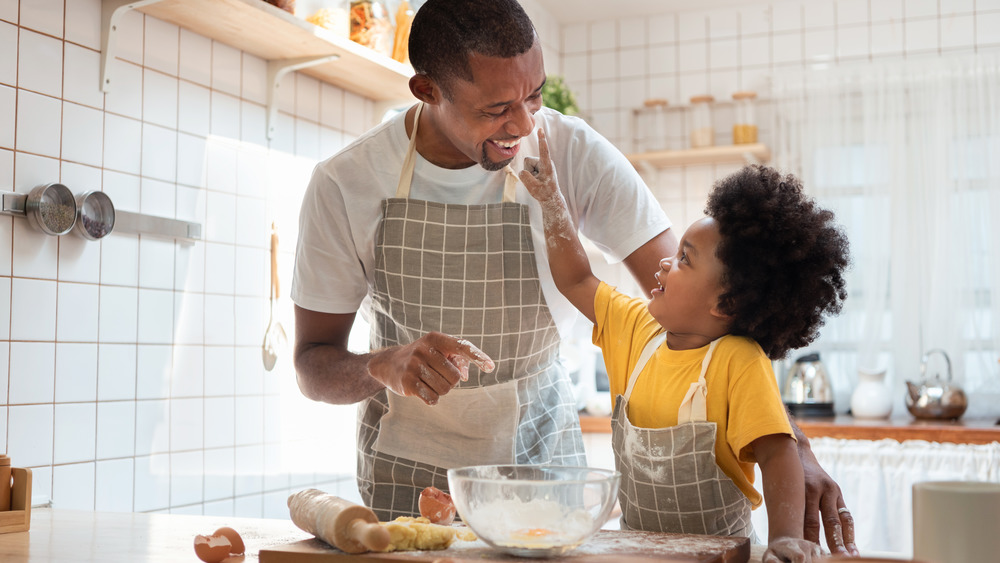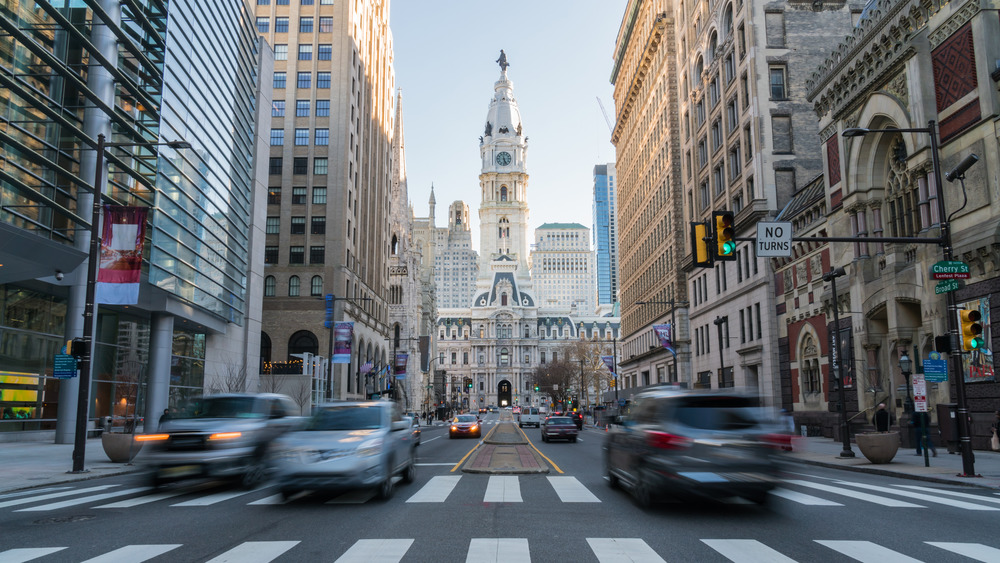Hell's Kitchen Judge Christina Wilson Dishes On Behind The Scenes, Plus, The Scoop On Gordon Ramsay - Exclusive
No matter how much of a Hell's Kitchen fan you might be, we're going to guess that there's a lot you probably don't know about this show, which premiered its 19th season on FOX January 7. For example, were you aware that there's always a lawyer on set (for good reason), and that contestants aren't allowed to exercise (for an...interesting reason)?
Fortunately for Mashed readers, Chef Christina Wilson, judge of this season's "Red Kitchen" and winner of season 10, was generous enough to provide an exclusive scoop on what really goes on behind the scenes during the production of one of the longest running cooking competitions on television. Best of all, Wilson dished up plenty of info on what Gordon Ramsay is really like; and, as a long-time contestant, judge, and head chef at Ramsay Steak in The Paris Las Vegas, it's safe to say that this Philadelphia native knows the famously hot-tempered culinary icon better than most.
Surprising things that happen behind the scenes of 'Hell's Kitchen'
You've been on so many seasons of Hell's Kitchen and in multiple capacities. What is the craziest moment that you've personally witnessed?
Oh, man. God, I've never been asked that, first, so I've never really thought about it. Craziest moments? Oh my, God, there's so many.
One of the craziest that I saw was in Season 18. It was early days, I want to say, maybe second or third dinner service? I think it was the third dinner service. There was a young lady called Jennifer, who was with the returning all-stars, over in the blue kitchen.
What happens when Gordon goes in the blue kitchen is, I try to rally my team quick and let them know, get your salmon on, get this going. And then when he comes back over, I try to get them together. I was there, he had gone into the blue kitchen to really start to give it to them.
I adored my rookies, they were by far my favorite group I ever had the opportunity to coach, even though it was just a short time. I'm talking to the rookies like, "Come on, guys. We've got to get over this."
And, all of the sudden, I hear all of this commotion, and I look over, and he and Jennifer were going at it. And I have never in my life seen Gordon get that angry. It was because she had accused him of sabotaging something that she had brought to the past.
People don't know this and it's not the sexy part of the show but there's a lawyer on set, from Fox, every time that we're recording, anytime there's a challenge or a dinner service. There's no funny business. It's a cash prize. It's handled just like a blackjack table would be. It has to be fair, all the way around.
[Gordon] took that very personally, and I've never seen him lose his temper like that in a service. He slammed down the whole bus tub. Yeah, she got kicked out immediately!
Why do you think this contestant pushed his buttons so much?
I think you can come after a lot with Gordon, and he'll stand there nose to nose and defend it. But coming after his integrity, for a show like Hell's Kitchen, that's been on now, coming up on 19 seasons, and helped really build the foundation of his U.S. success. Anybody that works on that show will tell you how much goes into it.
I think he didn't just take it as an insult to himself, but to what the rest of us do for that show also. Yeah, I think it's [that] his integrity was challenged. It was the one and only time I ever saw that happen. It shocked the hell out of me but it let me get my red team a little further ahead in the dinner service.
What else goes on behind the scenes at Hell's Kitchen that might surprise viewers?
Yeah, there's loads that goes on. I think that if I was ever granted a wish, I would love for people to see the audition process and I would love for people to see all the coaching that goes on.
What I was told was there's about 150 hours worth of tape that needs to be cut down to a 43 minute episode for every episode.
So, you have hours, and hours, and hours of tape. High five to the post-edit team that has to go through all of that. I think that if people knew, I think that they would like to see how much Gordon and the sous-chefs actually help coach the teams when they're behind for punishments, or ahead at dinner service when we're prepping. There's a lot of good value as a chef that you get between all the senior support that's there. But I think people would be surprised what a mentor role Gordon actually takes but that doesn't make it the best TV.
What Gordon Ramsay is really like, according to a Hell's Kitchen judge
What is Gordon Ramsay like as a person?
He's amazing. He's absolutely amazing. He's one of the most humble and gracious men, regardless of his success in life, that I have ever met.
He is an absolute puddle when he's around his kids. I think people would be legitimately freaked out if they ever saw him in the company of his wife and children.
I don't want to say he's a completely different person, because I think that lends to the idea that he is faking it on Hell's Kitchen, which he is not. But there is this side to Gordon you see in everything that he does, that he didn't come from much.
I can't say enough how humble and generous he is. Yeah, it has been the opportunity of a lifetime to be mentored by him and to have the opportunity to get close now.
It's been over eight years since the show but I've been on the corporate team for nearly six now. I just came back from London, in fact. I was over there helping open a restaurant at Harrods. To be the one that Gordon calls and says, "Hey, we need help." Yeah, it's an amazing feeling.
He has a fierceness obviously that comes through, though, on the show. How do you reconcile that with the softer side you're describing?
I would say that, the only time you ever really see him throwing plates, punching salmon, doing that kind of thing is during dinner service. He only does it on Hell's Kitchen and Kitchen Nightmares. Or 24 Hours to Hell and Back, that kind of thing.
And you see that side of him when it's either his name on the plate or guests are paying for food. You don't see him get that way during challenges. You'll see him be really constructive and give you some pretty honest feedback, same thing at MasterChef.
But the only time he really gets wound up is if food that shouldn't be going out of the kitchen is going out of the kitchen.
I think it's no different than an athlete. I know if I'm in dinner service with Gordon, he's got his game face on and it is just foot to the pedal the entire time. But when we're in a scrimmage, anything that's not dinner service, he's a little more pliable.
Chef Christina Wilson on what it's really like to be on Hell's Kitchen
As a contestant, what were the best and worst parts of competing on Hell's Kitchen?
The best parts were being challenged every day and not ever knowing where the wind was going to take you, because that's the point of the show. How much we learned, again, that one-on-one time.
For me, I had Chef Andi [Van Willigan] in the red kitchen ,and she's just absolutely brilliant. I certainly wouldn't be as successful on the show or beyond, if I didn't have her as a mentor on the show, and then for a few years after. She helped groom me for taking over her position, essentially, both with the restaurants and the show. I think the best was what you learn and just that kind of challenge every day.
The worst, for me, was there's no release. I know that's the point and they want it to be this kind of pressure cooker that continues to build up, steam, steam, steam until eventually somebody's going to blow. But you can't workout, there's no music, we weren't allowed to have even a pen and pencil in the dorm to journal.
Really? Why was that?
I guess for a couple of reasons. One of them is, I would imagine rights to music or TV shows or anything that might be in the background. That's just me speculating. I'm guessing that's why. But I think also, you don't ever want to date yourself. This season got filmed in April/May, of 2019, so there's no COVID regulations, there's no masks, there's none of that.
But what if I had the NBA finals on in the background and now it doesn't air for two years later, there's no real continuity. I think it's more logistics than anything. But to not be able to workout, to do yoga, to listen to music, to decompress in any way, to be able to pick up a phone and call a friend or anything like that. You're just consistently in a pressure cooker, surrounded by competitors. Nobody there is on your side and it's a really weird feeling. Yeah.
Because in the red kitchen, nobody falls, everybody supports everybody. It's just the exact opposite there. Yeah, I would say the no release of the pressure was the worst thing and then the best was the challenges and what you pick up from the people mentoring you.
What was your audition like?
It was two in-person auditions, one in Philadelphia, one in New York City. Actually, I guess it was three auditions on the East Coast and then I had a final one out in L.A. Funny enough, we don't have to cook for the Hell's Kitchen audition.
I think they do that on purpose, so people that are like, "yeah, I'm an executive chef. I'm the best [in] Philly."
Okay, fine. We'll see it for the first time in front of Gordon. We'll all see it for the first time. I get the mentality because people always lie... Come on, I got my first job lying on my resume!... I didn't lie, but I definitely padded it and made it look a little nicer than it maybe was.
But yeah, a couple interviews on the East Coast and then I made it to the final one out in L.A. And they do two seasons back to back, so I was out there with people going for Season 9 and Season 10. I got very fortunate to get cast for Season 10.
I like to think that they had all the crazy spots filled, and they were looking for a couple normal [people.] "You look clean. Keep your fingers out of your mouth. Okay, come on."... Timing is everything. It was very fortunate that I ended up on Season 10, not nine because my prize was a Gordon Ramsay restaurant. And the first one in Vegas. I couldn't have asked for a better aligning of the stars there for me.
What it was like to win Season 10
How did it feel when you actually won?
I remember saying the F-word. It's just one of my mannerisms, my dad does it too, when we laugh or have some kind of emotional reaction, we tend to put our hand on our heart. I can remember doing that when the door opened. Justin and I, I felt like, we got along so well and I really, truly felt like we were neck and neck all season. We have very different leadership styles and I think that's what tipped it for me, in the end.
I can remember holding my heart, saying the F-word, quietly, not loud. I kind of dipped back a little bit to see, did they may be open both doors this season, maybe it's something new, some new twist. I dipped back and I saw chef hugging him in consolation. I was like, okay. Then I got on the top of the steps and saw everybody down there and I remember very consciously making myself take a second just to kind of breathe it in because I won't experience that again in my life. Yeah, took a second and then just made sure I didn't trip going down.
I wasn't shocked. I was super proud. I knew I had given my best and it was very satisfying to know that my best was enough.
How did other contestants react when you won in Season 10?
My teammates were great. Even a lot of the people on the blue [team] were really good. I didn't get too involved in much of the drama. For me, I was on a job interview and I did my best to handle it that way the entire time.
Even Justin, who I went up against, I remember the night before, I was writing my menu as he was writing his and we were talking about it because I respect him so much and him for me. We're still great friends. He's doing amazing up in Hoboken, New Jersey.
Have you talked to other Hell's Kitchen winners? Has that been their experience winning, too?
Yeah, I do. Yeah, I've talked to winners and I've talked to runners up and a couple of the third place finalists.
I still have great relationships with a lot of those guys. I think ultimately, there's this sense of relief that it's over, that this thing that you signed up for that just absolutely throws you through the ringer, you're at that end point. I think most people just realize that they've given their best and the best result had come out.
How does it feel to be a role model, since you won?
Yeah. It's amazing. It's hard to find the things that make you feel good as a human being, in the food and beverage industry. I get off on creating jobs for other people, bringing great cuisine to regional markets, being a trendsetter.
But it's hard to really, truly feel like you're contributing to the harmony of the world, in this industry, or at least I find it hard. It wasn't something I was expecting, coming off the show....
I do my best, like I said, the camera's never off, but those moments that don't make the edit, I do my best to support and coach my team the best I can. Coming off the show, that was by far the most rewarding thing. I can say that even about my job now, is how many parents reached out to me about their young daughters who just were inspired, or want to learn how to cook now, or just that visibility is so important.
Has it been meaningful to you to have broken down barriers in the traditionally male dominated field of restaurants?
Yeah. It's great. I think when you're in the thick of it, or at least when I'm in the thick of it, I don't think about it. I don't operate on that level of thinking. But when I step away from it all and I look at the bigger picture, it is pretty remarkable.
One of the best things about working for Gordon is that he promotes and gives opportunity based on merit. People wouldn't know this either because you don't see the behind the scenes but it's all women. Women run all of his shows. My kitchen in the back, my support kitchen, it was all women led.
When you look at MasterChef, 24 Hours to Hell and Back, Nat Geo's Uncharted, there is a woman in charge of every single one of those culinary departments. Gordon gets it. He knows, to speak generally, we're just organized, we're on it, we listen, we work with less ego and we just stay focused. I think he, especially with the shows, just prefers that interaction.
It's crazy to think in 2020 that we're still trying to break ceilings here. I don't quite get it. But I also had the good fortune of growing up with three older brothers, so I never had that, "you can't do it." I was expected to keep up.
What to expect from Season 19 of Hell's Kitchen
What makes the newest season of Hell's Kitchen different from previous seasons?
I think the talent this season is amazing. I think that, it felt like as a sous-chef, there wasn't as much tension. It was competitive, but it wasn't catty. I was coming off of the All-Star Season, so you had this group of rookies on [season] 18, and then this group of seasoned all-stars who knew, not all the tricks, but knew a lot of the tricks and such. It's really nice to just have an evened out playing field and a nice, fresh, energetic crew. And then of course, being in Las Vegas is just unbelievable.
Was this season tougher than the one you won, Season 10?
I'm sure every Hell's Kitchen [contestant] will say that their season was the best and the hardest. I will absolutely say that about Season 10. I just thought it felt like the hardest. If I had to do Season 10 in Las Vegas, with that added pressure, I'd like to think that I'd still win–but there's just so much more going on.
You had five of Gordon's wildly successful restaurants all within eyeshot of each other. I can't really articulate the pressure it adds, but it is absolutely a lot, and then it's Vegas, too. We do nothing but entice people to be excessive and do things in abundance, so the cast had to really practice a lot of self-discipline and focus while they were there.
Have you seen any unusual auditions that didn't make the cut?
I haven't. They do that on purpose. They don't want the sous-chefs to have a predisposition of people before we actually meet them and see them in the kitchen. There's a great surprise factor for us, too.
Trust me, day one, we are all thrown for a loop. I did have the fortune of helping MasterChef Season 9 and 10 for casting. I went to a couple different cities.
I think I saw just under 2,000 people across three cities. We have to taste their food and it's been sitting there for about five hours. I saw some really wild stuff there, people that were incredibly talented, that I would have hired on the spot, and then other people that brought everything out of a bag and just put it on a plate. Full spectrum there, but no, we're not privy to the HK audition process.
What was the most unusual food you've tasted during a Hell's Kitchen audition?
When we were in Atlanta, we had three different people bring things that they had hunted themselves. Gamy things like rabbit, there was one duck, and there was venison. It was delicious, but also just a little unusual. I don't know if this guy was just in his backyard or his kids went home crying because he was trying to make it on Master Chef with the rabbit. Yeah, wasn't real sure.
Since you've been on so many seasons of Hell's Kitchen, do you have an opinion about what personality type will do best on the show, and what type of person can't handle the heat?
Yeah. You can size people up pretty quickly. One of the biggest tells is how they react to constructive feedback. You have your people that'll soak it in and, "yes, chef, okay." And they will apply it and move on.
You have your other people that'll get really defensive and shut down because they just don't know how to take feedback like that in the moment. And then you have your excuse type people, "I was going to do that" or no, "Marisa's the one that made the eggplant today," that just have to have something to say back.
Who I find is most successful are the ones that are, "yes, chef," absorb the feedback and then are able to apply it and grow significantly throughout their time on the show.
How working at McDonald's prepared Christina Wilson to be a prize-winning Hell's Kitchen chef
Your first restaurant job was at McDonald's. What did you learn from that experience?
Yeah. I learned very early on. I had a paper route when I was 12. I learned very early on that your own money equals freedom. So, from 12 on I always had a full-time job, usually a full-time summer job but I was always making money somewhere.
Yeah, I worked at McDonald's and they wouldn't let me go on the grill. They wouldn't let me in the kitchen because I was fairly put together, I was articulate for a teenage kid, I was 16 at the time. I was articulate. I was really good at math. It was a different time back then, we didn't have all the scans. It was just a different time in 1995.
I started giving away free food on purpose. I would get demerits on purpose because I knew if you got so many, you would get pulled from the register and put on the food side. So, I was giving away food like crazy and then they had to put me on the grill for breakfast. I would work from 6 a.m. to 2 p.m. I'd get up at 5, run the two and a half miles there, and work on the grill. That was my first taste of being in a kitchen.
How is working at McDonald's compared to a more sophisticated restaurant?
It's very systematic. There's this kind of big frame that goes down when you do all the eggs, so everything's the same shape. I remember the... God, I'm revealing too much, I think. They used to have the chicken nuggets in these drawers, these warmers. You would make a big batch and then they... I'm not sure how it works today. Back then, it used to get separated between white meat and dark meat. I think it's all white meat now.
We're growing kids. Teenagers just are hungry perpetually. I can remember, me and my coworkers always going to the chicken nugget drawer and sliding nuggets in our pockets and then going back to the drive-thru windows and popping chickie nugs.
But, yeah. It's very different than an independent or freestyle kitchen. But places like McDonald's, Pizza Hut, Chick-fil-A, they're so systematic. And operationally, I still apply things that I learned at 16, just the way you dress something in line and just being, again, very methodical and systematic in executing.
Did you think there was a good team atmosphere there, where everyone was kind of helping each other out?
At McDonald's? I think so. I was a teenager, I don't know if I had the bandwidth to really soak it all in.
I felt good about it. The lady who taught me was a super weird, really weird lady, but she was very open and welcoming. We had a real good time. Plus, it was a bunch of my high school mates that worked there too. Yeah, it was fun. It was a great experience. I don't eat a ton of McDonald's but... I had a great experience working there. I can't say anything bad about it.
Chef Christina Wilson's tips for aspiring chefs
What is your best advice for people who want to become better at cooking at home?
God, there's so many home tips. I think to stay curious is really the biggest thing. It's very rare that people get things right on the first try.
I think that shows like Hell's Kitchen, MasterChef, Top Chef, Chopped, all those, have really pulled the curtain back to the food industry. And I think people are super excited. And COVID, the lockdown also, how many loaves of sourdough did you see in that first lockdown on your Instagram? I saw loads. And then after that was dalgona coffee, and after that was pancake souffles. It's amazing to see people at home really just wanting to experiment.
I think that there's times that you might try a recipe that you just don't nail, and people will give up. But I think it's important to stay curious and find chefs, and blogs, and places where recipes are shared to keep your home interest. It drives me, not drives me nuts... It fascinates me about these generations, where they watch people do things, and they don't actually do them. Like YouTube and stuff, you watch people do stuff, it fascinates me.
I think that the more people who can stay curious and active, the more they have an appreciation for going out to eat for the amount of time and skill that goes into the craft of being a chef, and then that whole dining out experience.
When you try to make prime rib at home for the first time, and you have to go through all the steps, plus all the cleanup, the next time you go out to eat prime rib, maybe you won't be so upset to spend $50 for the plate because you know how much work goes into I before and after.
I could say, using an eggshell is the best way to get eggshell out when you crack an egg, or make sure you have an oven thermometer. There's a lot of home tips but I really think staying curious is an important one.
What about for somebody who wants to become a professional chef? Do you have any advice for getting started?
Yeah. I think one, it's really important to evaluate if you're passionate about cooking or if you want it for a career. There is a bit of a fine line there. I think that right now the industry, it's just such a unique time and it's not a great time for hiring. Actually, it's probably a good time to be trying to intern and that's how I came up with it.
I worked for free in a couple of well-respected restaurants in and around Philadelphia, and from there it just garnered more opportunities. I would say, if you have a friend or you know the owner of the local restaurant in your town, try to get in there for a shift or two, just to either observe or get your hands dirty, if you're allowed to, otherwise...
Yeah. God, it's so tough. The best I could say is, we call it staging, just kind of intern or do a little tour of your local restaurants and then practice at home.
What it was like becoming a chef in Philadelphia
You got your start as a chef in Philadelphia. What was that like?
Yeah, I was just in Philly about a week ago and I absolutely love that city. It's heartbreaking what's happening to them with the restaurant scene. Thank God for Philly. That restaurant scene is what birthed me. I earned my chops there and I'm so lucky. The way that the industry is in Philadelphia, versus other major cities, is it's really a collective. Every one of us, any chef that's even remotely significant in Philadelphia has worked in everybody else's kitchen for a shift or two.
We all share recipes, and ideas, and "I'm working on this tasting menu, come in Tuesday night, let me put it out for you and give me some feedback." You don't really get that so much in Chicago, New York, San Francisco, it's all hyper competitive. Where Philly, I find to be... They could give a s*** about the big names.
Do you think Gordon Ramsay will open a restaurant in Philadelphia?
People ask me all the time, "Why doesn't Gordon go to Philly?" I was like he wouldn't... I love my boss but it's just not the right city for it unless he took a steakhouse on Broad, or at the Four Seasons or something. Yeah, that would make sense. But local Philly people, they're not going to go to a Gordon Ramsay restaurant because it's a Gordon... They'll actually not go because it's a Gordon Ramsay restaurant, because we have that kind of protect the neighborhood, independent businesses [way of thinking]. But because of that, it's so supportive. When I left for Hell's Kitchen, I was working at a restaurant called Lolita on 13th Street, one of the top 50.
Yeah. It was hard for me to give up that job, but I knew if I kept my job and went on the show, I would have a safety net. I had to quit, so I didn't have the safety net and I would be able to mentally give my all to the show. Right move in the end. Yeah. Yay for Philly!
